Data Structures & Algorithms Lecture Notes
15 October 2010 • Java Collections
Outline
- The Java Collection Framework.
- Interfaces
- Collections and iterators.
- Implementations
- Abstract and concrete.
Objectives
- Gather and organize several related and common data structures.
- Gather and organize along object-oriented (polymorphic) lines.
- Provide a structure for developing other, more specialized data structures.
- Provide a mechanism for decoupling system components via consistent abstractions.
- Design and implementation leverage.
Collections
- The Java Collection Framework (JCF) contains
- Interfaces describing collection behavior.
- Implementation classes providing data structures.
- Abstract classes for other implementations.
- Also other odds and ends: backwards compatibility, adapters, and such like.
Example
- A part of the
Queuehierarchy showing the three components.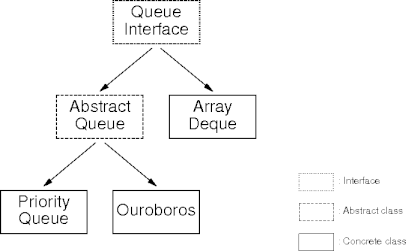
Collection Interface Hierarchy
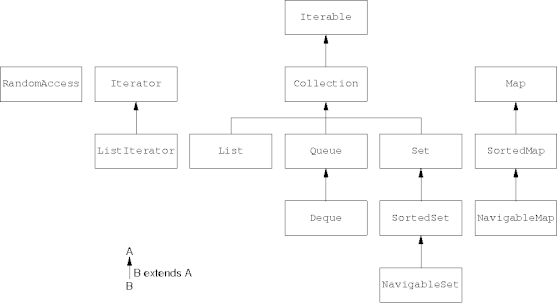
Collection Interface
- A group of elements (objects).
- Elements are ordered or not, duplicated or not.
- The interface is generic in the element type.
- The
Collectioninterface extends theIterableinterface.- Collections respond to the for-each statement.
The Collection Interface
interface Collection<E>
implements Iterable<E> {
boolean add(E e)*
boolean addAll(Collection<? extends E> c)*
void clear()*
boolean contains(Object o)
boolean containsAll(Collection<?> c)
boolean equals(Object o)
int hashCode()
boolean isEmpty()
Iterator<E> iterator()
boolean remove(Object o)*
boolean removeAll(Collection<?> c)*
boolean retainAll(Collection<?> c)*
int size()
Object[] toArray()
<T> T[] toArray(T[] a)
}* Optional
Optional Methods
- The element adding and removing methods are optional.
- Some collections are immutable.
- Collection implementations should throw a
UnsupportedOperationExceptionwhen inapplicable optional methods are called.- All methods are implemented.
- Some of the don't do much (just throw an exception).
Group Methods
- Some Collection methods accept a collection of elements and operate
over the whole data set.
boolean containsAll(Collection<?> c)s.containsAll(c)returns true if everything incis ins.boolean removeAll(Collection<?> c)s.removeAll(c)removes fromseverything inc.boolean retainAll(Collection<?> c)s.retainAll(c)removes fromseverything not inc.
Group Method Examples
- Let
sbe[ 1 2 3 ].s.containAll([ 1 3 ])returns true, leavessunchanged.s.containAll([ 3 4 ])returns false, leavessunchanged.s.removeAll([ 1 3 ])returns true,swill be[ 2 ].s.removeAll([ 3 4 ])returns true,swill be[ 1 2 ].s.removeAll([ 4 ])returns false, leavessunchanged.s.retainAll([ 1 3 ])returns true,swill be[ 1 3 ].s.retainAll([ 3 4 ])returns true,swill be[ 3 ].s.retainAll([ 4 ])returns true,swill be[ ].
Group-Method Implementations
-
containsAll()can be implemented using Collection interface methods:boolean containsAll(Collection<?> c) for (Object o: c) if (!contains(o)) return false return true - What about
removeAll()andretainAll()? Can they too be implemented using Collection interface methods?
Collection Interface Hierarchy
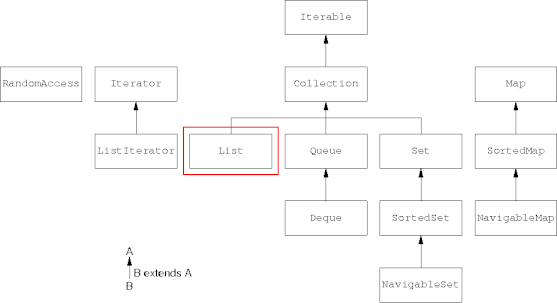
List Interface
- The
Listinterface tries to be general over sequences.- In particular, it wants to cover indexible as well as non-indexible sequences.
- The List interface also tries to be implementation independent.
- As a result, the List interface is somewhat complex to navigate and understand.
The List Interface
interface List<E> extends Collection<E> { boolean add(E e) void add(int index, E element) boolean addAll(Collection<? extends E> c) boolean addAll(int index, Collection<? extends E> c) void clear() boolean contains(Object o) boolean containsAll(Collection<?> c) boolean equals(Object o) E get(int index) int hashCode() int indexOf(Object o) boolean isEmpty() Iterator<E> iterator() int lastIndexOf(Object o) ListIterator<E> listIterator() ListIterator<E> listIterator(int index) E remove(int index) boolean remove(Object o) boolean removeAll(Collection<?> c) boolean retainAll(Collection<?> c) E set(int index, E element) int size() List<E> subList(int fromIndex, int toIndex) Object[] toArray() <T> T[] toArray(T[] a) }
Indexible List Methods
- What happens if the underlying implementation doesn't support indexing,
or provides expensive support?
- Optional methods (
set(), for example) can be skipped. - Required methods (
get(), for example) have expensive (linear) implementations.
- Optional methods (
Collection Interface Hierarchy
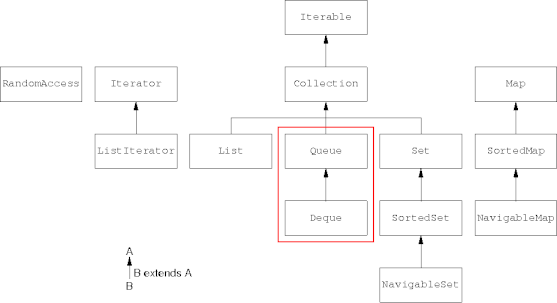
The Queue Interface
interface Queue<E> extends Collection<E> { boolean add(E e) boolean addAll(Collection<? extends E> c) void clear() boolean contains(Object o) boolean containsAll(Collection<?> c) E element() boolean equals(Object o) int hashCode() boolean isEmpty() Iterator<E> iterator() boolean offer(E e) E peek() E poll() E remove() boolean remove(Object o) boolean removeAll(Collection<?> c) boolean retainAll(Collection<?> c) int size() Object[] toArray() <T> T[] toArray(T[] a) }
The Queue Interface
- The
Queueinterface provides two sets of methods differing in their error behavior.Throws Returns exception special value Insert add(e)offer(e)Remove remove()poll()Examine element()peek() - For example,
emptyq.element()throws an exception
emptyq.peek()returnnull.
The Deque Interface
- The
Dequeinterface extends theQueueinterface.- It adds front and back versions of the
Queueoperations.addFirst(e), removeFirst(), getFirst() offerFirst(e), pollFirst(), peekFirst() addLast(e), removeLast(), getLast() offerLast(e), pollLast(), peekLast()
- It adds front and back versions of the
Collection Interface Hierarchy
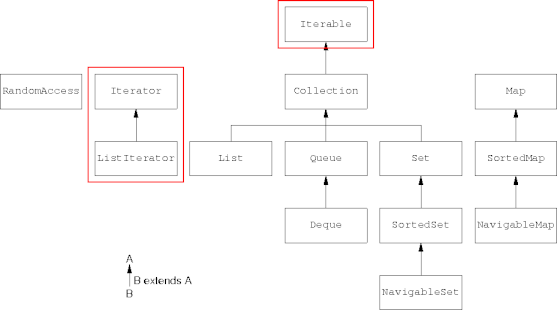
The Iterator Interface
- Example use:
final Iterator i = c.iterator() while (i.hasNext()) f(i.next())
public interface Iterator<E> {
boolean hasNext()
E next()
void remove()*
}
* Optional
List Navigation
- The
next()andprevious()methods- move the iterator appropriately and
- return the element moved over.
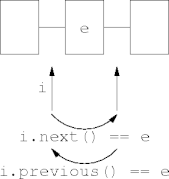
List Iterators
- The Iterator interface sacrifices features for generality.
- It doesn't do much, but it applies widely.
- The ListIterator interface extends the Iterator interface to provide
more features.
- Bi-directional navigation (next and previous).
- In-traversal list modifications.
- More control over list positioning (indexing).
The List Iterator Interface
public interface ListIterator<E> extends Iterator<E> { void add(E e)* boolean hasNext() boolean hasPrevious() E next() int nextIndex() E previous() int previousIndex() void remove()* void set(E e)* }
* Optional
List Iterator Indexing
- ListIterator (or cursor) positions lie between adjacent list elements.
- Or before the first element or after the last element.
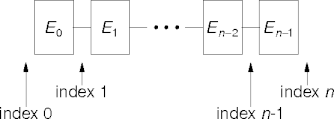
List Manipulations
- A new element is added before the next or after the previous element.

- Adding to an empty list is easy.

Removing Elements
-
remove()removes the element returned bynext()orprevious().
-
next()orprevious()must be called before each call toremove().
Better Iteration Code
- Iterating over values is such a common activity that having to write
final Iterator i = c.iterator() while (i.hasNext()) f(i.next())
(or similar) every time is poor design.
- Package iterations in a more abstract for-each loop form:
for (T e: c) f(e)
The Iterable Interface
- The Iterable interface indicates a class that can iterated over using
for-each loops.
public interface Iterable<E> { Iterator<E> iterator() }- Essentially: here's the iterator you need, without all the details.
- Classes not implementing the Iterable interface cannot partake in for-each loops.
Interface Declarations
- Remember: for greatest flexibility, use the highest (most abstract) interfaces possible as variable types.
- From high to low:
Collection<Integer> pending = new ArrayDeque<Integer>(); Queue<Integer> pending = new ArrayDeque<Integer>(); Deque<Integer> pending = new ArrayDeque<Integer>();
Implementation Hierarchy
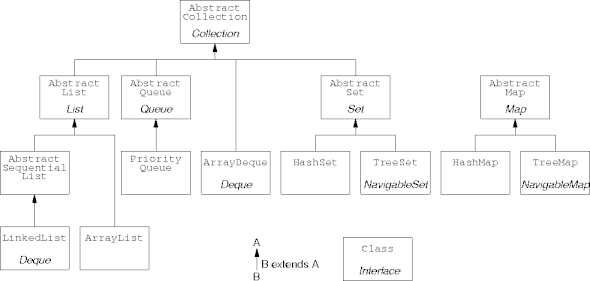
Abstract Implementations
- The more practical collection interfaces contain many method
definitions.
- Implementing classes have to implement them all, if only to fail when called.
- The abstract implementation classes provide a skeleton
implementation for further development.
- The concrete class is a child of the abstract implementation class.
Example
- The
AbstractQueueclass implements theQueueinterface.public abstract class AbstractQueue<E> extends AbstractCollection<E> implements Queue<E>
- It contains around 40 methods.
- The
PriorityQueueextendsAbstractQueue.public class PriorityQueue<E> extends AbstractQueue<E> implements
Serializable
Linked Lists
- The
LinkedListclass extends theAbstractSequentialListclass. - The interfaces specify a doubly-linked list.
- The
AbstractSequentialListclass assumes a dynamic link implementation.- That is, indexing is expensive.
Array Lists
- The
ArrayListclass implements a linked list assuming indexing is cheap.- That is, an implementation based on dynamic arrays.
-
ArrayLists are more efficient than areVectors.- But
ArrayLists aren’t thread safe andVectors are.
- But
Random-Access Iterators
- The
RandomAccessinterface indicates efficient indexing.- Faster:
for (int i = 0; i < lst.size(); i++) f(lst.get(i))
- Slower:
for (Iterator i = lst.iterator(); i.hasNext(); ) f(i.next())
- Faster:
-
RandomAccesscontains no methods; it just flags classes with efficient indexing.
Priority Queues
- The
PriorityQueueclass stores elements in increasing priority order (a min-priority queue). - The queue elements can implement the
Comparableinterface. - A queue can be created with a
Comparatorimplementing, overriding the element comparable, if any.
Where’s Stacks?
-
Stacks were added to Java before the Collection Framework (v. 1.0 vs v. 1.2).
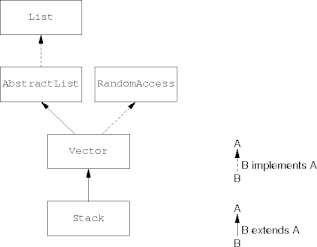
Summary
- The Java Collection Framework designs and implements a group of common data structures.
- Declare variables with the most abstract interface type possible.
- Keep in mind that retreiving a value through a list iterator also moves the iterator.
References
- Collections (Chapter 13), Core Java vol. 1 eighth ed. by Cay Horstmann and Gary Cornell, Prentice Hall, 2008.
- The Java Collections Trail by Josh Bloch, Sun Microsystems.
| This page last modified on 15 October 2010. |
